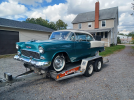Captain Brainstorm
Well-Known Member
I would also think the oil filter takes out any particulates, so what exactly would be contaminating the oil?They could very well be running a break in on the engine before it goes into the car. Especially a high end car like that.
Hell processes have gotten so much better that residual contamination in the block is so minimal as to be almost nothing.(Which is why most cars don't require a short break in change when new)
I saw the AP method also, makes sense and matches up with what the dealer says. I'm asking for a friend.First 100 miles was lots of engine braking (still under 4000 RPM max). Just basically running one gear lower than you would for cruising and varying the RPMs.
I followed the GT car head, Andreas Prueninger, suggestion adopted to the Carrera RPM range.
4000 for 400 miles
4500 at 600 miles
5000 at 800 miles
5500 at 1000
6000 at 1200
6500 at 1400
7000 at 1600
Redline at 1800
First oil change at 1500 miles even though Porsche says 1 year or 10K miles. Now I’ll do once a year which is 4 to 6K miles.
Yea the manual would be the gold standard. Whatever it says is definitely what should be followed. The mind blowing thing to me is the people that don't trust it(in this case it's the cars which say no break in change required or the guys who still change their oil at 3k miles ect ect) and think they know better than the guys who designed built and tested everything.
Not sure I subscribe to the no break-in school of thought. I could agree with it if the manufacturer ran some type of procedure on a dyno, but I think most high-end car makers run the engine up to redline cold before it even goes in the car just to make sure it was assembled properly and nothing catastrophic would happen. Car engines are made with different types of metals with different rates of thermal expansion. I would think that logically some thermocycling is required over time before driving balls-out.












